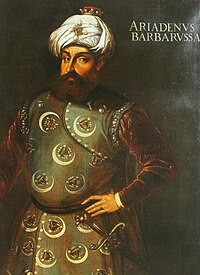Khaireddin Barbarossa
| Hayreddin Barbarossa | |
|---|---|

A portrait of Hayreddin Barbarossa
|
|
| Nickname(s) | Barbarossa (Red Beard) Hayreddin Hızır Reis |
| Born |
c. 1478 Mytilene, Lesbos, Ottoman Empire |
| Died | 4 July 1546 (aged 67–68) Istanbul, Ottoman Empire |
| Allegiance |
|
| Service/ |
|
| Years of service | c. 1500–1545 |
| Rank | Admiral |
Hayreddin Barbarossa (Arabic: Khayr ad-Din Barbarus خير الدين بربروس), (Latin: Ariadenus Barbarussa), or Barbarossa Hayreddin Pasha (Turkish: Barbaros Hayreddin (Hayrettin) Paşa or Hızır Hayreddin (Hayrettin) Paşa; also Hızır Reis before being promoted to the rank of Pasha and becoming the Kapudan Pasha), born Khizr or Khidr (Turkish: Hızır; c. 1478 – 4 July 1546), was an Ottoman admiral of the fleet who was born on the island of Lesbos and died in Constantinople, the Ottoman capital. Barbarossa's naval victories secured Ottoman dominance over the Mediterranean during the mid 16th century, from the Battle of Preveza in 1538 until the Battle of Lepanto in 1571.
Hayreddin (Arabic: Khayr ad-Din خيرالدين, which literally means "goodness" or "best of the religion" of Islam) was an honorary name given to him by Sultan Suleiman the Magnificent. He became known as "Barbarossa" ("Redbeard" in Italian) in Europe, a name he inherited from his elder brother Oruç Reis after he was killed in a battle with the Spanish in Algeria. Oruç was also known as "Baba Oruç", which sounded like "Barbarossa" (Italian for "Redbeard") to the Europeans, and since Oruç did have a red beard, the nickname stuck. In a process of linguistic reborrowing, the nickname then stuck back to Hayreddin's native Turkish name, in the form Barbaros.
Khizr was born in 1466 or around 1478 in the village Palaiokipos on the Ottoman island of Midilli (Lesbos) (now Greece), the son of Yakup Ağa, a converted Turk sipahi of Albanian origin from Giannitsa (Greece), and an Orthodox Christian, Greek woman from Mytilene (Lesbos). His mother was a widow of a Greek Orthodox priest. His parents were married and had two daughters and four sons: Ishak, Oruç, Khizr and Ilyas. Yakup took part in the Ottoman conquest of Lesbos in 1462 from the Genoese Gattilusio dynasty (who held the hereditary title of Lord of Lesbos between 1355 and 1462) and as a reward, was granted the fief of the Bonova village in the island. He became an established potter and purchased a boat to trade his products. The four sons helped their father with his business, but not much is known about the daughters. At first Oruç helped with the boat, while Khizr helped with pottery.
...
Wikipedia
